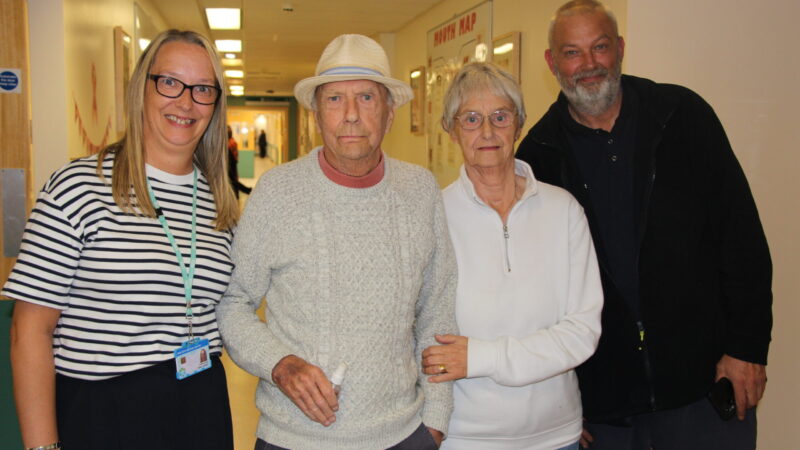
AN NHS worker is urging people to be aware of a condition that can cause severe brain damage if not treated within four and a half hours – after her dad was on the cusp of losing his life.
Claire Lambert, who works as a clerical officer at University Hospitals Tees, received a very distressing call on 29 September from her mum Maureen after her dad, Thomas Lambert collapsed at the local bus stop in the early morning.
Thomas, 79, was quickly helped by locals and managed to reach home but went straight home to sleep – thinking his morning dizziness was just a sign of being tired.
After her mum’s call, Claire and her brother Neil Lambert quickly rushed to her dad’s home in Billingham and when she entered, she found her dad fast asleep.
“My dad only had an hour left for his life”
When Claire asked her dad what happened, Thomas described the entire episode as a ‘funny spell’ and told everyone that he would get better if he just slept again.
But Claire spotted that her dad’s hand was scrunched, which meant the hand had become stiff and resisted stretching.
Thanks to her years of experience in the NHS, Claire instantly knew something was wrong and called NHS 111 for medical advice at 12.44pm, who sent an ambulance to their house.
Claire said: “Paramedics arrived to assess dad where they found his speech to be slurred but this was not a major concern as he had been like this since he had his treatment for cancer in his neck and mouth.
“But paramedics did the necessary tests and decided he had to go to the hospital as they suspected my dad had suffered a stroke.”
The ambulance arrived at the University Hospital of North Tees around 2pm, where he was assessed by the stroke team and underwent a CT scan to learn more about his condition.
After a brief period, the stroke team led by Dr Sarah Whitehouse informed Thomas and his family that he had suffered a right total anterior circulation stroke due to blockage from a blood clot.
This is a severe type of ischemic stroke that potentially could damage up to a third of the brain.
The team also told Thomas’s family, that if he was not treated within the four and a half-hour window, he was at risk of facing severe brain damage that could cause severe paralysis or further extreme complications.
Dr Whitehouse, consultant in stroke and geriatric medicine, and her team promptly administered thrombolysis, a medical treatment using “clot-busting” drugs to dissolve blood clots and restore blood flow.

But the clot-busting drug did not work for Thomas and he was urgently sent to The James Cook University Hospital to undergo mechanical thrombectomy to remove the clot.
Claire and her family were informed that Thomas only had one hour to remove his blood clot and to avoid paralysis, brain death and further complications.
With less than an hour left, Thomas successfully underwent the procedure at 4.35 pm.
Dr George Thomas was part of the team at James Cook that performed the pioneering operation.
He said: “It has been a decade since this revolutionary procedure was introduced. It is uncommon to have patients with a stroke like Thomas’s present within six hours of symptom onset. We get the best results in the six hours from when a stroke starts.”
“The crucial four-and-a-half-hour window”
He was moved to the neurology and stroke unit on ward 34 and went home next day. As he continues his recovery, Thomas and his family are eager to raise awareness about the symptoms of stroke as the majority of the public is still unaware of the symptoms.
Claire added: “I feel that the public is unaware of stroke symptoms, as we were totally unaware of the four-and-a-half-hour period for a patient to be treated when the signs are first spotted.”
Thomas said:
“I am so grateful to the doctors, nurses, consultants and stroke teams at University Hospitals Tees, as I know they rushed to see me when I arrived and made me and my family understand how little time I had for my life to be saved.”
Over the past years, hundreds of patients have presented to hospitals with a stroke after the crucial four and a half-hour period at University Hospitals Tees, which has resulted in many of them potentially missing out on life-saving treatment options.
Dr Whitehouse said: “Luckily, Thomas’s family quickly recognised his stroke symptoms and took appropriate action by calling for an ambulance.
“Due to this, it was suitable for both our acute stroke treatments, thrombolysis and thrombectomy. Without these treatments, Thomas would have been very disabled by his stroke.
“I would strongly advise people to either call NHS 999 if they suspect a stroke or visit the NHS website for more information.”